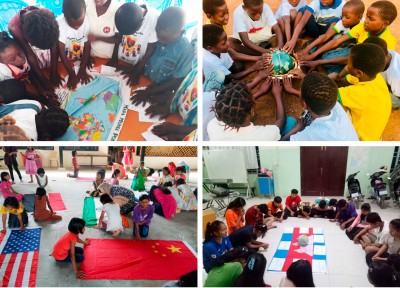Iran: good and bad news
19 Mar 2020Iran has temporarily released tens of thousands of prisoners in recent weeks to stop the spread of coronavirus. Among these prisoners is British-Iranian charity worker Nazanin Zaghari-Ratcliffe She will be required to wear an ankle tag and remain within 300 metres of her parents' home. ‘The issue now is to make it permanent’, her husband Richard said. Pray for this to be the beginning of a permanent release for her. Meanwhile Iran has recorded the highest toll of deaths outside China and Italy. WHO said that 15% of Iran’s deaths were aged under 40. This is unprecedented, as across the world death rate the under 50’s is well below 1%. An Iranian pulmonologist said, ‘Realistically, at this point, the reported sick cases are 1 million.’ As a measure of Iran's desperation, it has requested a $5billion emergency loan from the International Monetary Fund - the first time they have sought western help for sixty years. See
Nigeria: displaced Christians refused aid
19 Mar 2020Among two million people who fled Islamic extremist violence in northern Nigeria are hundreds being denied help because they are Christians. Displaced Muslims receive government-built homes, land, and financial support for resettlement, but 347 Christians are denied help because of their faith. ‘We cannot watch them die because they are unwilling to turn to Islam for support. We want to start something, no matter how small’, said a Christian leader of a small organisation (name withheld for security reasons). He wants to free land on the organisation’s properties to build homes for Christian converts denied entry into camps for the displaced. Many are left to die on their own, as no food or shelter is made available to them. The leader said, ‘We had tried within our little resources to help these ones, but the rejected people without external help to survive are too many.’ The organisation is now seeking support and funding.
India: police implicated in Hindu riots
19 Mar 2020As the Hindu mob descended, Delhi market stalls were reduced to ashes, just 100 metres away from two police stations. The mobs came three times; desperate stallholders repeatedly ran to the police stations crying out for help, but the gates were locked from the inside. No help came. ‘How could they set fire to our market in such a horrific way, while it is so close to two police stations, and not be stopped?’ said a shopkeeper. ‘If I complain against the police I will face very serious trouble.’ The worst religious conflict to engulf Delhi in decades raises questions about the role that the police played. 75% of the 51 dead were Muslim, and many Muslims are still missing. The catalyst for the riots is widely acknowledged to be a BJP leader declaring that if the police did not clear the streets of objectors to the new citizenship law, his supporters would be ‘forced to hit the streets’.
Pastor Huang Lei leads a church in Wuhan. The coronavirus crisis makes it impossible for his church to have their usual gatherings, so they are meeting online. They are not just doing church, but being church. ‘First, we have more than 50 groups,’ he says. ‘Almost all the groups are meeting via the internet - praying, studying the Bible, sharing, witnessing, praising and worshipping. Of those 50, we have over 30 groups spending two hours every day to pray, worship, share and testify together. That’s far more frequent than our normal meetings. Of course, now we have more free time; everybody is staying at home, so that’s given us the chance to do this. But we usually have the group meeting weekly and now we’re doing this daily. Sometimes even more, so we are very grateful for that.’
USA: send asylum seekers to Mexico or Canada
19 Mar 2020Officials in Donald Trump‘s administration have been briefed on plans to block all asylum seekers and foreigners from entering the USA as a response to the coronavirus epidemic. All persons on the border with Mexico, apart from American citizens, will be turned back. The same policy is set to apply to the border with Canada. The plan could also see all illegal border crossers returned without due process, and asylum seekers will not be held in American immigration facilities. Anyone caught entering the US illegally will be transported to the nearest point of entry without detention by Border Patrol agents.
Syrian mother gives birth amid bombs
12 Mar 2020Haya was nine months pregnant when she fled from IS soldiers with her family and miraculously reached a hospital just as she went into labour. Fighting was fierce and staff were caring for the wounded as she gave birth. Then bombing increased and everyone had to leave the hospital. Haya couldn’t move. Her temperature was dropping fast; she told the nurses she was dying, and asked them to give her baby to her husband and leave her behind. Not long afterwards she felt a very warm hand touching her, moving her down the stairs, and a voice said, ‘Do not be afraid: I am the Lord Jesus Christ, and I am by your side.’ Upon arriving at the exit doors, she felt a surge of energy and was able to flee the bombing. She is now safe with her family and baby, and says on that day there were two new births: her baby and herself, as she became a strong believer in Christ.
A heart-warming story
12 Mar 2020Spring comes late to Nanai country in the Russian Far East. Ice on the river is three feet thick, after winter temperatures of 40o below zero. Anton, Timur and Misha were sent by Wycliffe Russia to Siberia to learn about the Nanai people and their language. When they arrived at a village, they were welcomed by a leader who was a Christian. His mother, however, was not a Christian and she did not approve. The Bible translators demonstrated a Nanai audio dictionary to a small group, including the disapproving mother. She was not a believer, but she was passionate about her language and was surprised to find that Anton and his friends shared her passion; so she accepted them and became their friend. After hours discussing the language using Bible stories, the conversations turned to God. The leader’s mother listened intently, no longer disapproving. Because these visitors were interested in her language, she was now interested in their God. See also the world article on Tajikistan.







